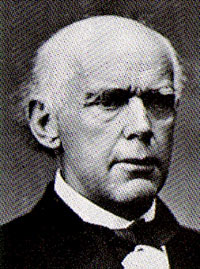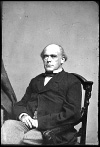Salmon P. Chase
Salmon Portland Chase was born on January 13, 1808, in New Hampshire. After his father died when he was nine years of age, he was sent to Ohio to live with an uncle, who was the Protestant Episcopal Bishop of Ohio.
In 1824, he enrolled at Dartmouth College. After graduating in 1826, he moved to Washington D.C., where he taught school while studying law.
He was admitted to the bar in 1829, moving back to Ohio the following year. Settling in Cincinnati, he practice law and became involved in anti-slavery activities. Initially a Whig, Chase helped to form the anti-slavery Liberty party, and became one of its leaders.
After the Mexican War, he helped form the Free Soil party,  which was dedicated to preventing the spread of slavery. which was dedicated to preventing the spread of slavery.
He was elected to the U.S. Senate in 1849, and took positions against the Compromise of 1850 and the Kansas-Nebraska Act.
Following the passage of the Kansas-Nebraska Act, Chase was an early proponent of the formation of the Republican Party. As a Republican, he was elected Governor of Ohio in 1855 and 1857, before returning to the U.S. Senate in 1860.
He was a candidate for the Republican Presidential nomination in 1860, but lost to Abraham Lincoln. When Lincoln assumed office, he named Chase as his Secretary of the Treasury.
Chase was capable in his position as Treasury Secretary, but his political ambitions often placed him at odds with the president. He had little confidence in Lincolnís ability to run the war, and began to campaign for the 1864 nomination. Finally, he offered his resignation in mid-1864, and Lincoln accepted it.
Nevertheless, when an opening came, Lincoln appointed Chase as Supreme Court Justice in October of 1864. While Chase found his position on the Court to be monotonous, he became Chief Justice.
In 1868, the Congress voted Articles of Impeachment against President Andrew Johnson, who had assumed office following Lincolnís assassination. As Chief Justice, Chase presided over the trial in the Senate. In his attempts to be fair and impartial, he alienated many in the Republican Party to such extent that he was named as a possible candidate for the Democratic nomination for the Presidency, but the nomination went to Horacio Seymour.
In 1870, Chase suffered a stroke. Although he returned to the Court in 1871, his health was poor, and he suffered another stroke in the spring of 1873, and died on May 7th of that year.
|

